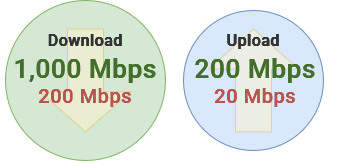Internet
You will need internet access for your home server and the devices connecting to it. Your Internet Service Provider (ISP) is the primary factor thatleading informsto the quality and stability of your server connection.
Connection
Outside of your hardware, your internet connection dictates how many people can access your server as well as their connection quality, stability and uptime.
Type
There are many different consumer options for connecting your home to the World Wide Web.
|
stylus_laser_pointeR |
This is one of the fastest internet connections available, utilizing light to rapidly transmit data over long distances.
|
| Cable |
Fast and cost-effective, this form of internet that uses television infrastructure to transmit data to a local internet provider.
|
| satellite_alt |
Available in even the most remote areas, this internet connection occurs through satellites in orbit around the planet.
|
| Wifi_tethering |
This allows devices to connect to a wireless network broadcast over a large area by an internet service provider.
|
| settings_phone |
One of the first consumer
|
| Signal_cellular_alt |
Quickly gaining in popularity, this internet option uses wireless cellular data infrastructure to create a local area network for your devices.
|
We recommend a hardwired internet connection such as cable or fiber because they are more reliable. Wireless connections like satellite and mobile broadband can be heavily reliant on other external factors like congestion and weather.
Speed
Your exact upload and download speed needs will depends on what services you're hosting and for how many people. For a home server serving your immediate family, here is a good starting pointpoint:
|
Download |
Download Minimum: 200Mbps Recommended:
|
| Upload |
Upload Minimum: 20Mbps  Recommended: 200Mbps
|
Gigabit connection speeds or better are recommended for media servers, but low-bandwidth websites may perform acceptably withat slower speeds.
Bandwidth
Depending on your Internet service provider and connection type, there may be restrictions on how much data can be transmitted outside your network.
Self-Hosting
Each Internet Service Provider has their own rules and regulations in regards to server hosting on residential and business plans. Generally, business connections are most costly, but are more stable with the option of renting a static IP. Your provider may have additional stipulations regarding the nature of the content – self-hosting personal services may be less controversial than a for-profit commercial storefront.
You are not breaking any laws by self-hosting a server at home. However, not all ISPs expressly permit web hosting from residential internet connections. While a few embrace self-hosting, many others choose not to advertise the feature. Unfortunately, ISPs are more frequently directly blocking the required ports for running a Web server.
Before proceeding, you must understand the terms of your agreement with your internet service provider.
If your ISP blocks web server hosting, there are still a few options to connect while away from home. When feasible, upgrading to a business plan may permit web hosting. Alternatively, configuring a CloudFlare tunnel may circumvent the block by channeling web traffic through their remote servers first.
Finally, hosting your own VPN server will allow your devices to remotely connect to your Local Area Network. This allows remotely-connected devices to interact with computers on your network as if your were at home.
